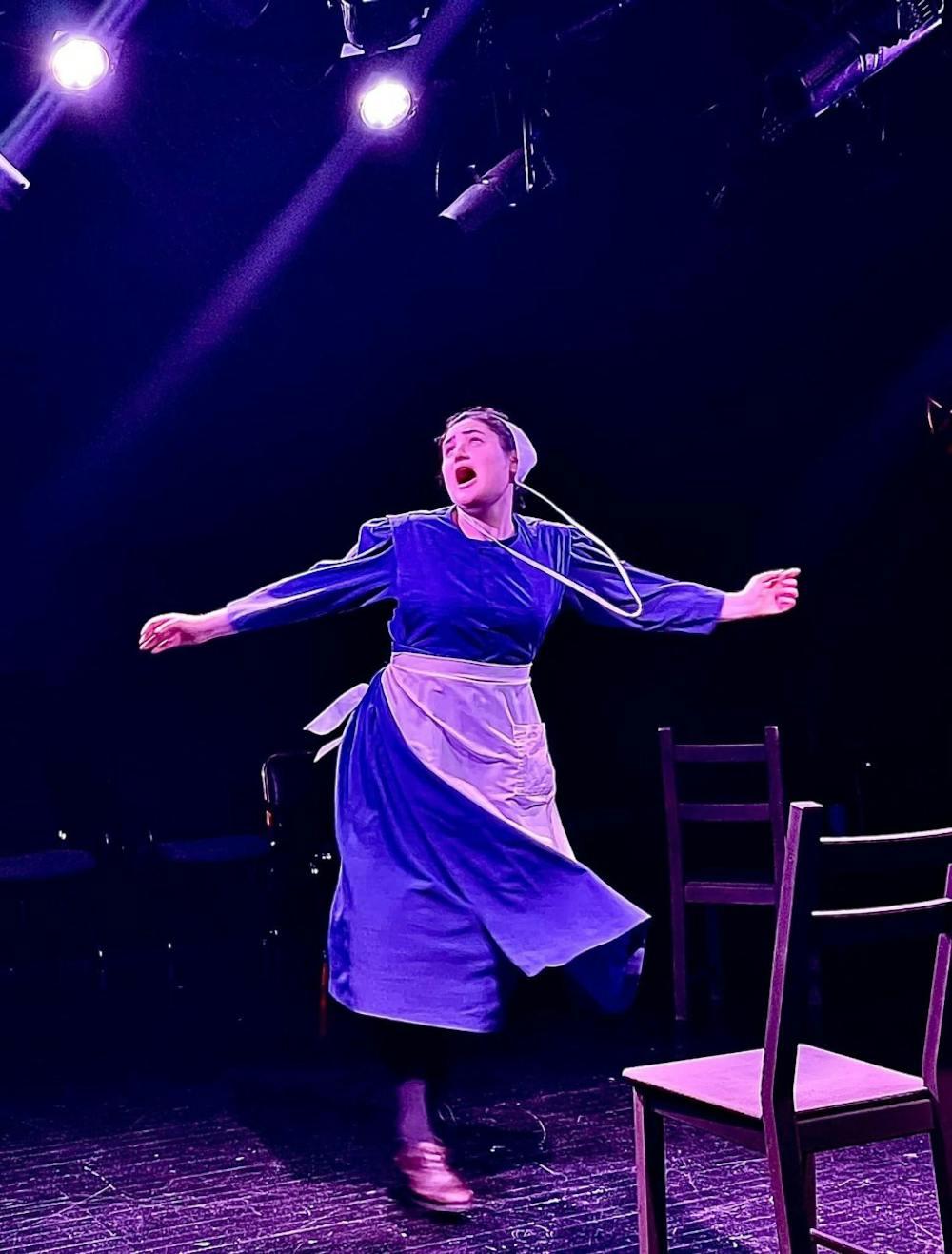With her senior distinction project, a one-woman production of “The Amish Project,” senior Tenley Seidel is exploring the nuanced community dynamics behind unconditional forgiveness.
The play, originally written by Jessica Dickey, follows the true story of the 2006 West Nickel Mines shooting, which took place in a one-room Amish schoolhouse. The tragedy made national media because of the Amish community’s response: they emphasized forgiveness and reconciliation, even setting up a donation fund for the gunman’s wife and children. Seidel’s production follows the lives of those impacted – the victims, the gunman and his family, the townspeople of Nickel Mines – as they attempt to grapple with the horror they’ve lived through and what lies ahead.
Seidel didn’t always know her path lay in theater. While she has “always loved acting” and is active in student-run theater organization Hoof ‘n’ Horn, she didn’t originally plan on declaring a theater studies major (her other major is in global cultural studies). The choice wasn’t made until the end of her junior year, when she realized she’d taken so many theater classes that she “might as well finish out the degree.”
Finishing out a theater studies degree, for many Duke undergraduates, involves a senior distinction project: over the course of a year, students produce either independent research or a performance piece in an art medium of their choice. Seidel decided on the latter.
In finding a topic for her performance, she looked to mentors for advice – María Zurita Ontiveros, a Duke Theater Studies alumna who directed “Medea” as her senior distinction project in 2020, and Professor Talya Klein, who taught the introductory acting class where Seidel fell in love with theater.
“I was talking to [Ontiveros] about her work on ‘Medea’ last spring, and I asked her how she selected her distinction project. Her advice was: ‘You need to choose the thing that scares you the most,’” Seidel said. “Later, I was speaking with [Talya Klein], the professor who basically launched my theater studies career, and she suggested, ‘You know, you should do a one-woman show.’ And the idea of that terrified me.”
Klein ended up introducing Seidel to “The Amish Project”. She’d already received more than forty project suggestions from various faculty members – but “The Amish Project” blew her away. “I read it, and immediately I was like, ‘Oh my God, I need to do this.’”
With the help of her advisor, Dr. Jeff Storer, Seidel has worked on “The Amish Project” tirelessly over the past eleven months. She has faced a host of challenges: finding financial support, memorizing over an hour’s worth of consecutive lines, trying to portray seven different characters with a cast of one.
“Even though there are seven characters, the playwright instructs the actor to wear the same costume – a traditional Amish dress – throughout the entire play,” said Seidel. “So the question is: how can anyone tell which character I’m supposed to be representing at different points? That’s when we started experimenting with things like posture and voice inflection. It became a game of finding techniques that were comfortable, healthy, that I could settle into.”
Despite the obstacles she’s had to overcome, Seidel is still excited about “The Amish Project.” One of the things she loves most about the play is its unusual structure.
“In many ways, it’s like a collage. The play relies on a lot of the conventions of documentary theater, using real interviews and real text to tell a story,” Seidel said. “But the playwright describes it as a fictional exploration of real events. All of the characters are fictionalized; none of their names are the real names of the people involved. So it’s this really unique blend.”
Seidel also appreciates its empathetic take on tragedy. “Although it does dissect the tragedy, [‘The Amish Project’] doesn’t dwell on it the way one might expect it to. Because it’s about how forgiveness functions within a community, forgiveness is what the audience is tracking throughout the play, not horror. It turns a story of horror and tragedy into one of transcendence, of being okay with sitting in the unresolved. Ultimately, they’re all just trying to understand: Should I have seen this coming? What does this mean for our community?”
“The Amish Project” will play at Brody Theater Feb. 24-26 at 7:30 p.m. and Feb. 27 at 2:00 p.m. No tickets or registration are required.
Content warning: “The Amish Project” explores heavy themes, including school shootings and sexual violence. Viewer discretion is advised.
Get The Chronicle straight to your inbox
Sign up for our weekly newsletter. Cancel at any time.
Jules Kourelakos is a Trinity senior and a managing editor of The Chronicle's 120th volume. She was previously Recess editor for Volume 119.

